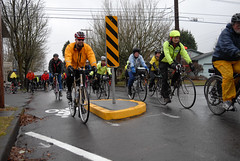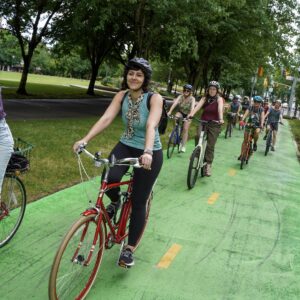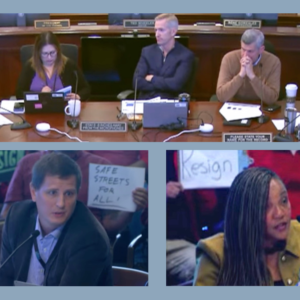With budget season heating up it’s time to delve into what the Bureau of Transportation has in mind for bikes in the coming fiscal year.
Last year the budget was created in what Mayor Adams referred to as a “very difficult environment.” One proposal (that thankfully did not come to pass) was to trim the city’s spending on Safe Routes to School by 40%.
Things are much different this year.
Because of the Jobs and Transportation Act of 2009 (H.B. 2001), the PBOT budget will see its first significant influx of money from the State of Oregon for the first time in a decade. As we reported back in November, H.B. 2001 will pump $14 million into local transportation projects (from a mix of gas tax and motor vehicle registration fee increases).
The question now is, how will PBOT prioritize that money? According to PBOT spokesperson Cheryl Kuck, the money will be allocated along priorities set in Mayor Sam Adams’ 2008 Safe, Sound and Green Streets effort (which failed to pass City Council, but the outreach and research that went into it is still used).
Kuck says the $14 million will go primarily toward repaving major arterials, upgrading City bridges, improved crossings near transit stops, and a host of other projects — including new bike facilities and other traffic safety projects.
With the influx of cash from H.B. 2001 the City also plans to double the “Affordable Transportation Fund” from $500,000 to $1 million in the coming fiscal year (which runs from July 2010 to June 2011). That fund was created last April by Mayor Adams by putting a portion of utility franchise fees into a fund for biking and walking infrastructure (it was initially called the “Bicycle Infrastructure Improvement Fund”).
PBOT wants the additional $500,000 to pay for continued progress on the their bike boulevard plans.
Adding in another H.B. 2001 allocation of $500,000 for “sidewalk improvements” and $500,000 from the General Transporation Revenue account (which totals $85.6 million), PBOT plans to dedicate $2 million of their capital budget to biking and walking projects in the coming fiscal year.
Despite the budget boost from Salem, PBOT must cut 4% from their General Fund. According to Kuck, that equates to cuts totaling $260,682. To meet the reduction goal, PBOT plans to cut $245,219 from “street lighting operations and maintenance,” $3,479 from their “transportation demand management sustainability programs,” and 11,989 from “downtown marketing services.”
All bureaus must submit their final budget to the Office of Management and Finance by February 1st. Stay tuned for more coverage of the budget process.








Thanks for reading.
BikePortland has served this community with independent community journalism since 2005. We rely on subscriptions from readers like you to survive. Your financial support is vital in keeping this valuable resource alive and well.
Please subscribe today to strengthen and expand our work.
Let’s hope that some of these funds are spent on driver education (both existing and new).
This is great news, but the truth is we need so much more. . .
Let’s talk about a warming planet.
Let’s talk about how the abundance of cars affects Portland’s quality of life and the health of it’s citizens. Let’s talk about the hundreds of acres of public space that is presently being usurped by people’s private autos (on-street parking).
Then let’s talk about how automobiles need most of the funding because their needs are so under addressed.
Don’t get me wrong, i am thankful for all this money and the hard work behind it. i am just sayin’ let us not forget, we’re still playing infrastructure catch-up and need a lot more millions for bikes, asap.
I realize the $ amount being cut is piddling, but what exactly are “transportation demand management sustainability programs”?
To Michael #3:
“Transportation Demand Management Sustainability Programs” are the city programs that encourage alternatives to the use of single occupancy automobiles. For more information:
http://www.portlandonline.com/transportation/index.cfm?c=34768
Michael #3
“Transportation demand management sustainability programs” are the city programs that encourage alternatives to single occupancy automobile use.
For more info:
http://www.portlandonline.com/transportation/index.cfm?c=34768
Roger, thanks. The Transportations Options group is my favorite part of PBOT. I guess I never thought of it as “demand management,” though it sort of is.